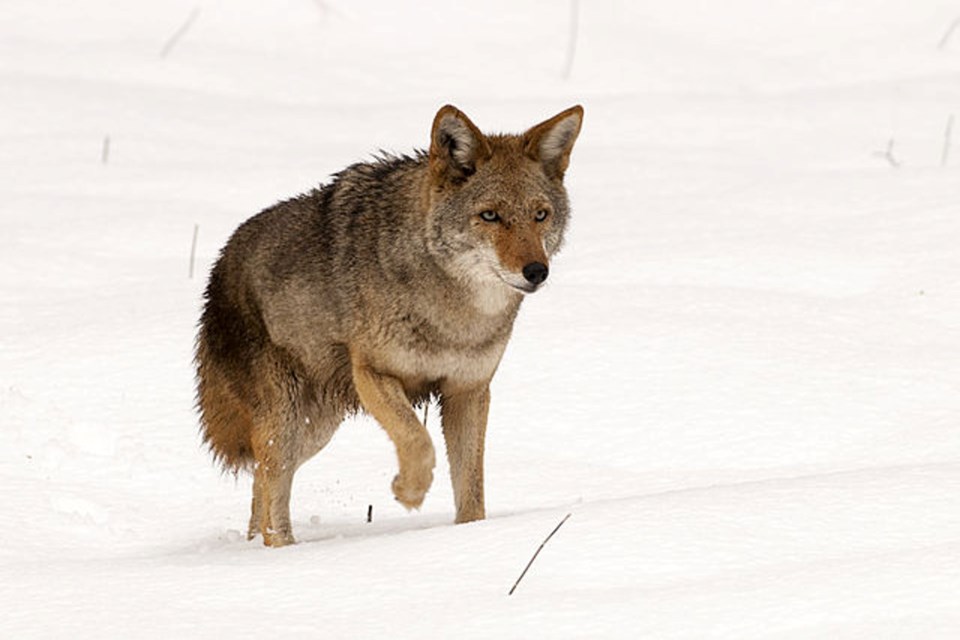Lesley Sampson believes urban coyotes have been mischaracterized in Toronto — and she’s calling on the public to learn how to coexist with the canines in city parks, streets and green spaces.
The founding executive director for Coyote Watch Canada, Sampson argued there have been growing misconceptions surrounding the species after a series of alleged attacks by a pack of coyotes on pet owners’ dogs in the west end made headlines last summer.
The incidents — which occurred over the Canada Day long weekend at Princess Margaret Park — left several dogs and one dog owner with injuries, according to reports.
In response, Coyote Watch Canada joined city officials and Toronto Animal Services for a public meeting in August to discuss the incidents and provide residents with safety tips moving forward. A question-and-answer session sparked a number of divisive opinions, and some called for the coyotes to be relocated or euthanized.
But Sampson noted those kinds of poor interactions, in most cases, are not the coyote's fault. Pet owners letting their dogs off leash remains a significant issue in Toronto and is among the greatest factors in promoting these conflicts, she said.
“It needs to be addressed. A coyote isn’t just going to go after a dog for no reason. In fact, there are many coyotes, foxes and their babies that are killed or injured by dogs every year. Dogs are an issue in High Park, Bloordale — every area. Nobody talks about that though, everybody gets uncomfortable,” she explained.
According to the City of Toronto, coyotes generally do not pose a danger to people — but can pose a danger to pets. They thrive in urban areas because of the abundance of food and shelter available.
Residents are urged not to feed coyotes or approach their dens or their young as it could impact their migratory patterns and lead to consequences for the animals, pets and residents alike.
“When someone is trying to entice and play with coyote pups around dens, that increases families’ proximity tolerance to people,” Sampson said. “It also escalates the individual coyote or family to more interactions with people and dogs.”
The incidents over the summer occurred close to where city councillor Stephen Holyday lives (Ward 2, Etobicoke Centre). After noticing the discourse and confusion during that heated public meeting in August, Holyday recently drafted a letter and introduced an amended motion for managing coyotes in Toronto.
Toronto Animal Services will have until the fourth quarter of 2025 to return to council with updates to its Coyote Response Strategy, with additional attention to:
- Attacks to attended pets resulting in injury/death or consequential injuries to humans
- Groups/families of coyotes
- Provocation of coyotes that leads to problematic interactions
“There’s a lot of different understandings and perspectives about what the municipality does in these types of circumstances,” he said. "[We need] more information available to the community and a re-examination of our policies to make sure they’re current and in line with other municipalities that are seeing similar things.”
Overseeing a trio of coyote education events around Toronto this week, Sampson doesn’t want people to think the discussion comes down to “dogs versus coyotes.” She believes there’s a place for both sides to share the land.
“This isn’t about picking sides or about being right, it’s about what’s happening in the landscape and how we can minimize or avoid these situations,” she said. “It takes an entire community to support coexisting and maintaining safe and appropriate boundaries between people and wildlife.”
Residents are asked to dial 3-1-1 if they witness someone feeding a coyote, or if they see a coyote doing the following:
- Approaching dogs or people;
- Exploring a home or building far from a large park or open area;
- Limping or staggering or with paralyzed hind legs;
- Acting confused around non-living objects;
- Biting pets; or
- Appearing sick or injured.
Additional information and tips on dealing with coyotes in Toronto can be accessed by clicking here.
